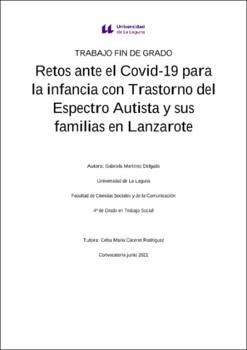Retos ante el Covid-19 para la infancia con trastorno del espectro autista y sus familias en Lanzarote.
Fecha
2021Resumen
Las personas con Trastorno del Espectro Autista (TEA) suelen presentar mayores
dificultades para comprender y adaptarse a los cambios, lo que puede conllevar un
mayor nivel de estrés y ansiedad; de ahí que este grupo de población sea especialmente
vulnerable a las restricciones impuestas como consecuencia de la aparición del Covid19. Teniendo esto en cuenta, este estudio se dirige a conocer los principales retos a los
que se han enfrentado las familias con niños y niñas con TEA en Lanzarote durante el
periodo de confinamiento por Covid-19, así como a explorar las características
sociodemográficas de esta población e indagar en el papel del Trabajo Social durante
este periodo. Se trata de un estudio descriptivo mixto, dividido en dos fases principales.
En la primera, han participado 24 familiares, respondiendo un cuestionario electrónico
autoadministrado; en la segunda parte, se han realizado dos entrevistas grupales, una de
ellas a tres profesionales de dos de los centros de atención especializada de la isla, y otra
realizada a dos madres de niños con TEA. Entre los principales retos a los que se han
enfrentado las familias durante ese periodo de confinamiento destaca el cambio brusco
de rutinas, y la adquisición de nuevos hábitos. En cuanto al papel del Trabajo Social en
ese periodo de aislamiento, se destaca la labor relacionada con la búsqueda de recursos
y la coordinación con otras entidades, junto con el apoyo y acompañamiento
proporcionado a las familias. People with Autism Spectrum Disorder (ASD) tend to have bigger difficulties to
understand and to face changes, which can lead to have a higher level of stress and
anxiety; Hence, this population group is especially vulnerable to the restrictions
imposed as a result of the appearance of Covid-19. Keeping in mind, this study aims to
know the main challenges that families with children with ASD have faced in Lanzarote
during the period lock down by Covid-19. As well as to explore the sociodemographic
characteristics of this population and to look into the role of Social Work during that
period.
This is a mixed descriptive study, divided into two main stages. In the first stage
24 families have participated answering a self-administered electronic questionnaire; In
the second part, two group interviews were conducted, one of them with three
professionals from two of the island's specialized care centers, and the other one with
two mothers of children with ASD. Among the main challenges that families have faced
during this period of lock down, it stands out the abrupt change in routines and the
acquisition of new habits. Regarding the role of Social Work in this period of isolation
it stands out the search of resources, the coordination with other entities, connected with
the support and accompaniment provided to the families.





